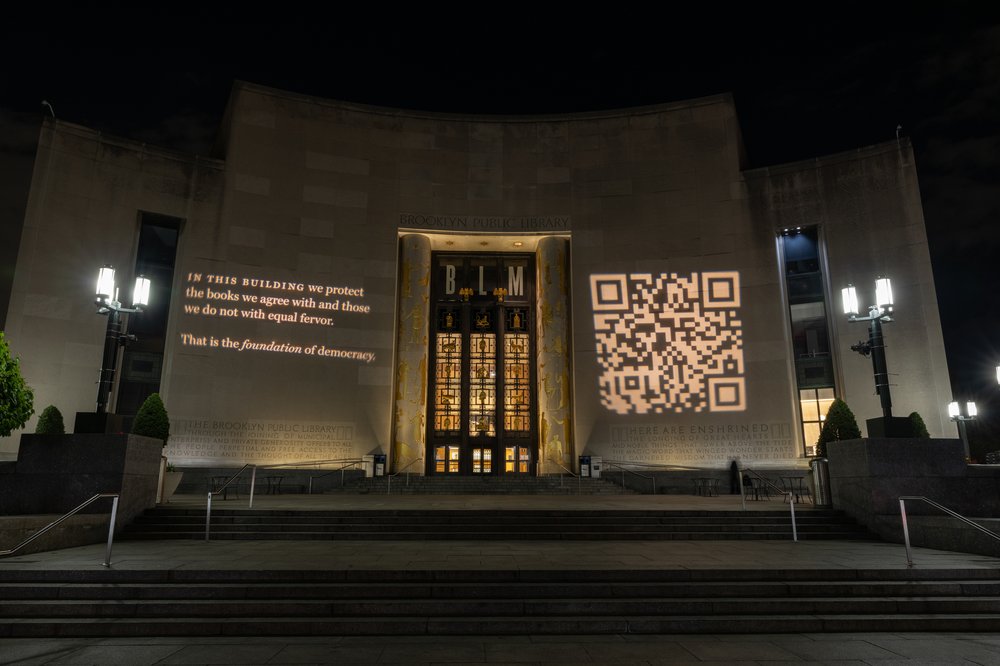A 'teen council' at the Brooklyn Public Library combats book bans nationwide
Aug. 2, 2023, 2:01 p.m.
An 18-year-old shared his experience fighting a book ban in New Mexico, giving local students a newfound appreciation of life in New York City.

A teen from New Mexico recently had an urgent message for his peers in New York City: “You always think it can’t happen to you until it does.”
Ivan Torres, 18, shared his experience with local students through the Brooklyn Public Library’s Intellectual Freedom Teen Council. The unique program connects kids from the most populous U.S. city with teens from states where book bans are roiling communities.
Torres recalled how a small group of activists in his hometown of Rio Rancho – population 104,046 – sought the removal of several books from libraries, including “Never a Girl, Always a Boy,” a transgender memoir by Jo Ivester, and “This Book is Gay,” a guidebook for queer life by Juno Dawson.
Speakers at a Rio Rancho City Council hearing said the books were “predatory” and had “no social value.” One member of the group that sought the works' removal reportedly said the effort was about “protecting our children.”
According to the American Library Association’s Office for Intellectual Freedom, there were 1,269 calls to censor library materials in 2022, the highest number of attempted book bans since the association began documenting them more than 20 years ago. The most challenged books last year were “Gender Queer” by Maia Kobabe; “All Boys Aren't Blue” by George M. Johnson; “The Bluest Eye” by Toni Morrison; “Flamer” by Mike Curato; “Looking for Alaska” by John Green; and “The Perks of Being a Wallflower” by Stephen Chbosky.
While there have been scattered reports of parents criticizing books distributed to New York City’s public schools in recent years, particularly “Our Skin: A First Conversation About Race,” by Megan Madison and Jessica Ralli, the five boroughs have remained relatively insulated from the book challenges that have spread across the country.
Teen councilmembers say they’ve learned a surprising lesson from out-of-state students: Books on the required reading list in many New York City schools are being banned elsewhere.
Miri Bawa, a 16-year-old from Bay Ridge, was among the local teens who said they had a newfound appreciation for living in New York City.
“I think it's just kind of crazy hearing about all the book bans,” said Bawa, who interns at the library. “I think about my English teacher and the little library she had in her classroom. I can't really relate to that, because we had books … that were written by Black people and by queer people, and I think about how I'm sort of privileged to have the opportunity to read those books.”
Torres recalled the ordeal in Rio Rancho during a Brooklyn Public Library get-together over Zoom last month. He said he was prepared for the fight because of what he’d learned through the meetings on book bans.
He organized a group of students to testify in support of the challenged works at a City Council hearing. The students spoke about how important it was for them to see themselves represented in these books.
“It’s deeper than just literature. Representation does matter,” said Torres, who identifies as a member of the LGBTQ+ community. He noted high suicide rates among LGBTQ+ youth. One 2022 survey found that nearly half of queer youth had seriously considered suicide in the last year.
“When you ban books you ban people. You’re sending a message that a certain kind of person is not fit for public display … to be publicly visible,” Torres said.
Rio Rancho residents against the bans also argued that the people calling for the books’ censorship had not followed the required rules for getting them pulled from the shelves. The challenge ultimately failed. Now, Torres is running for the local school board and sharing what he’s learned with other teens as part of the Brooklyn Public Library's teen council.
He credited the program for “bridging that gap” between youth who are experiencing book ban fights first hand with those who are not.
Xin Yi He Cen, 15, is also a councilmember as well as an intern at the library. She plans to launch a banned book club at her Staten Island high school next fall.
“I feel like removing books from school [is] how certain ideas and perspectives are suppressed and hidden,” she said. “It limits students’ … exposure to different viewpoints so we don’t develop empathy to diverse opinions.”
The teen council began last year as a focus group tied to the library’s effort to increase access to challenged books by offering free e-cards to young applicants nationwide. The name for that initiative, Books Unbanned, emerged from one of the teens’ brainstorming sessions.
“Think of it as an intellectual freedom meetup, a place of entry for teens wanting to know more about book bans and what actions they can take,” said Karen Keys, the library’s youth services coordinator.
She added that even if local students aren’t experiencing the bans directly, their existence elsewhere also affects them.
“They're often part of marginalized communities that are targeted in these bans and challenges,” she said, adding that many of the members are LGBTQ+ or people of color. “They understand how important it is to be involved in this fight.”
The Brooklyn Public Library’s free e-card program offers access to its entire digital catalog to applicants ages 13 to 21 nationwide. So far more than 6,500 youth from all 50 states have applied for ecards through the program, and checked out more than 110,000 items.